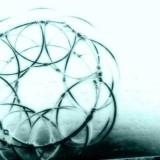Exploring The Volta
-
Robert Gardiner
10 years agoVolta
Volta, ( Italian: "turn") the turn in thought in a sonnet that is often indicated by such initial words as But, Yet, or And yet.
The volta occurs between the octet and sestet in a Petrarchan sonnet and sometimes between the 8th and 9th or between the 12th and 13th lines of a Shakespearean sonnet, as in William Shakespeare's sonnet number 130:
My mistress' eyes are nothing like the sun;
Coral is far more red than her lips' red;
If snow be white, why then her breasts are dun;
If hairs be wires, black wires grow on her head.
I have seen roses damask'd, red and white,
But no such roses see I in her cheeks;
And in some perfumes is there more delight
Than in the breath that from my mistress reeks.
I love to hear her speak, yet well I know
That music hath a far more pleasing sound;
I grant I never saw a goddess go;
My mistress, when she walks, treads on the ground.
And yet, by heaven, I think my love as rare
As any she belied with false compare.
Placing a volta in a sonnet is the most difficult part for many people.
To help visualize a volta or turn in your sonnet, think of this:
When you are walking through a field, you may at some point decide to change direction by turning.
You might turn one small degree from your previous direction, or you might turn all the way around, 180 degrees and head in the opposite direction. You may do the same thing in a sonnet. Where the turn comes in the sonnet also sometimes depends on what type of sonnet you are attempting to write. In a Shakespearean sonnet the turn usually comes at the ninth line.
An easy example of a turning point would be, lines 1-8 ask a question or series of questions and lines 9-14 answer the question or questions.
The turn might be in the theme of the poem, the sound of the poem, the emphasis of the message or image of the poem. Or, like the blank-verse sonnet, you may choose to consciously omit the volta. However, if you decide to omit the volta, you should do it with purpose and not just to avoid the work of putting a turn in your sonnet.
In our example sonnet, the sonnet writer spends the first 8 lines of the sonnet telling us some of the reasons he wants to live, but then he turns from all of that and in the last 6 lines of the sonnet he confesses that his last moments are spent doing none of these things, but rather he spends them in writing a sonnet.
Example;
He turned the fourteenth glass and said, "Begin."
and I had fourteen minutes left to live;
and I had fourteen unrepented sins,
and fourteen people whom I would forgive,
and fourteen unread books upon my shelf,
and fourteen loves I knew I'd loved in vain,
and fourteen dreams I'd kept within myself
(the fourteen I'd most wanted to explain.)
But fourteen minutes quickly passed away.
I filled my pen with fourteen drops of ink-
the fourteenth glass had offered one delay;
and fourteen final grains retained the brink.
This sonnet flowed like fourteen final breaths-
the fourteenth line, the fourteenth grain, then death.
i believe, "The Volta" is something you have to plan for and plan to fit in to your sonnet. You have to sort of built your sonnet around use of "The Volta". You just can't take a pivot (turn) in the midst of your sonnet, without forethought, as to how you plan to turn and building up to that turn, so that you keep on rhythm and you flow in and out of the turn. -
Michael D Nalley
10 years agoI recall receiving harsh criticism for using higher case letters to begin lines not to mention beginning a line with "And" but some of the lyrics to turn, turn does that at the breaks
http://thevalueofsparrows.com/2013/03/01/poetry-gethsemani-ky-selections-by-thomas-merton/
To everything, turn, turn, turn.
There is a season, turn, turn, turn.
And a time to every purpose under heaven.
A time to be born, a time to die.
A time to plant, a time to reap.
A time to kill, a time to heal.
A time to laugh, a time to weep. -
Everlasting
10 years agoMy two cents ( lol I think I am just repeating myself on this thread from the previous thread) but I believe that indeed, like Robert's opinion, I think the Volta can be planned. But I also think that in odd occasions the Volta can also happen on its own. I mean as if one were writing free verse.


